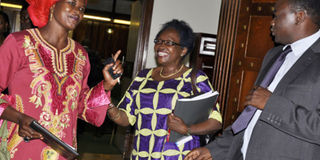Caution as budgeting closes

Finance minister Maria Kiwanuka (C) chats with Arua Woman MP Christine Bako (L) and Kole MP Fred Ebil shortly after a budgeting session at Parliament on Thursday. PHOTO BY GEOFFREY SSERUYANGE.
What you need to know:
As MPs come to the end of this process, it is prudent that they tax betting but leave agriculture and schools.
It has not helped matters that the budgeting is in the evening of its life, in fact, that has compounded the dilemma that we all find ourselves in today.
Parliament under the guidance of Deputy Speaker Jacob Oulanyah, is currently working around the clock to ensure that the 2014/15 budget is passed this month.
However, the attendance and participation of members in the budgeting process is disappointing. The MPs continue to dodge the proceedings with impunity.
As the case for last year, the MPs scrapped the tax government had imposed on paraffin users. They wanted to do the same for salt but failed. Amid protests from some legislators, the ruling party used its numerical strength in the House to endorse an additional Shs30 on a kilo of salt.
Shadow Finance Minister Geoffrey Ekanya presented a minority report, rejecting the VAT on salt but was defeated by the mob. Ekanya made an about-turn and withdrew his minority report but on condition that next financial year, salt is exempted.
In taxing salt, the MPs who confessed that they buy votes with salt, forgot that in some parts of the country, especially in the countryside where the majority poor reside, people can’t access this essential commodity.
Certainly, the Shs30 VAT charge on a kilo of salt is going to burden the poor people in the government quest to raise Shs8b.
But with hindsight, we can still forgive the MPs as long as they don’t accept the proposed tax on agricultural inputs. If farmers are given incentives and other tools needed to market their produce, they can then be empowered [economically] to buy salt and other basic necessities at any given price.
Going forward, let’s increase the tax on cigarettes, beer and betting and not agriculture sector, the spine of Uganda’s economy.
Finance minister Maria Kiwanuka had removed all tax exemptions for agriculture chain inputs and slapped an 18 per cent Value Added Tax (VAT).
The minister proposed taxes on hoes, pangas, acaricides, pesticides, seeds, wheel barrows, milk cans, packaging material, etc. But Parliament is under obligation to correct this anomaly even if it means losing revenue.
We understand that the government is stuck because they need a balanced budget in order to give the services to the people, but it will be a mistake if Parliament allows the government to use agriculture as a bet.
The country’s Agriculture Census of 2008/2009 revealed that most farmers were not using inorganic fertilizers because they are expensive and introducing VAT will escalate the prices further.
The good news is that some MPs have vowed to block these tax measures for fear that they would kill the agriculture sector.
The MPs have also threatened to block the proposed tax on private schools they say would kill the education sector. But in all these threats, the Leader of Government Business expressed concerns that the government might not be able to finance the Shs15 trillion- budget even after Ms Kiwanuka rejected a proposal by the opposition to increase tax on sports betting to generate revenue.
Way forward
After rejecting the proposed taxes, Parliament should focus on addressing the structural bottlenecks in the sector. There is need for government to undertake a comprehensive review of the sector to make it a truly country’s economic spine, with clear goals and targets, identified priorities and defined strategies.
The government should also ensure that the budgetary allocation for the agricultural sector is increased in accordance with the Maputo Protocol that recommended for 15 per cent.
The government should also institute measures to drastically increase the production and quality of traditional commodities such as coffee, cotton, tea, cocoa and bananas through the use of modern technologies, provision of targeted incentives, tax relief, credit support, as well as legislation to promote the use and consumption of targeted agricultural products.
For instance, Brazil, the world’s biggest producer of cassava, has a piece of legislation that requires at least 20 per cent of local cassava flour be used as an ingredient in bread production. We can also emulate this.
On the tax on gas, it means that Ugandans who cannot afford gas, will now opt for charcoal and this will definitely have a damaging effect on our environment.
Statistics from National Forestry Authority indicated that Uganda is losing 92,000 hectares of forest cover every year.
Uganda’s forest cover was in 1990, estimated at 4.9 million hectares covering 24 per cent of the total land area.
Business in Parliament
• PAC on Auditor General’s Report for 2012/13
Tuesday: Parliamentary Commission- Clerk to Parliament Jane Kibirige
Wednesday: Office of the Prime Minister- PS Christine Guwatudde Kintu
Thursday: Kampala Capital City Authority headed by- ED Jennifer Musisi
• Parliament will continue with the debate on the proposed taxes in the 2014/15 budget. After confirming salt tax, the House is expected to meet on Tuesday to decide on the proposed taxes on hoes, fertilizers, seeds. They will also decide on the proposed tax on private schools. MPs have vowed to reject this tax.
• NSSF Probe will this week meet former NSSF Managing Director David Chandi Jamwa, IGG, Ms Irene Mulyagonja, Solicitor General Francis Atoke and management of NSSF. The Committee is investigating nepotism and other irregularities at the Fund.
• The Committee on Commissions Statutory Authorities and State Enterprises chaired by Ibrahim Ssemuju will also meet this week to consider the auditor general’s report.
• On Tuesday, Speaker Jacob Oulanyah is expected to read the President’s letter (September 8) to Ms Rebecca Kadaga, communicating that Amama Mbabazi had been replaced with Dr Ruhakana Rugunda as the new PM and Leader of Government Business in Parliament government.




